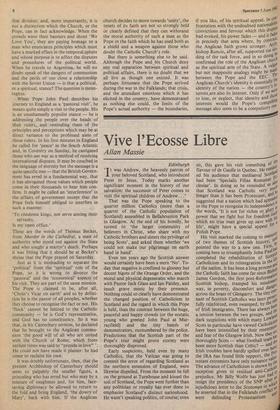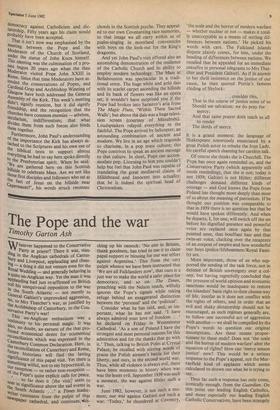Vive 1'Ecosse Libre
Allan Massie
Edinburgh jt was Andrew, the heavenly patron of 1 your beloved Scotland, who introduced Peter to Jesus. Today marks another significant moment in the history of our salvation: the successor of Peter comes to visit the spiritual children of Andrew ...'
That was the Pope speaking to the quarter million Catholics (more than a quarter of the Catholic population of Scotland) assembled in Bellahouston Park in Glasgow. At the end of his homily, he turned to 'the larger community of believers in Christ, who share with my Catholic brothers and sisters the privilege of being Scots', and asked them whether 'we could not make our pilgrimage on earth hand in hand'.
Even ten years ago the Scottish answer would certainly have been a stern `No'. To- day that negative is confined to gloomy but decent bigots of the Orange Order, and the moral and physical degenerates who march with Pastor Jack Glass and Ian Paisley, and insult grave music by their presence. Nothing could so clearly have demonstrated the changed position of Catholicism in Scotland and the regard in which this Pope is held, than the contrast between the huge, peaceful and happy crowds (or the ecstatic young who greeted John Paul at Mur- rayfield) and the tiny bands of demonstrators, outnumbered by the police. Predictions that the Scottish part of the Pope's tour might prove stormy were thoroughly disproved.
Early suspicions, held even by many Catholics, that the Vatican was going to commit the error of regarding Scotland as the northern extension of England, were likewise dispelled. From the moment he fell on the ground at Turnhouse and kissed the soil of Scotland, the Pope went further than any politician or royalty has ever done to emphasise Scotland's distinct nationhood. He wasn't speaking politics, of course; even
so, this gave his visit something of the flavour of de Gaulle in Quebec. He rell7„d ed his audience that mediaeval Scotia': had been `Specialis Filiae Romanae „, clesiae'. In doing so he reminded us 8‘,,511 that Scotland was Catholic very tnuhe longer than it has been Protestant, and ed suggested that a nation which had aciPeaip to the Pope to recognise its independence.4 the words, 'It is not for riches or glory power that we fight but for freedom itS,C.. which no true man gives up save with,,–; life', might have a special appeal ,
Polish Pope. rin
His visit marked the coming to ma tu' d of two themes of Scottish history, allby pointed the way to a new one. First:hos coming here so triumphantly John Pau' ': completed the rehabilitation of Scott1,e Catholicism and its reintegration in the Did of the nation. It has been a long process oar the Catholic faith has come far since Bist!°0 James Gordon, the first post-Reformatory° Scottish bishop, tramped his missi°1/,,,r, way, in poverty, discomfort and dart'ro. across the braes of Glengarry. The tinY re r, nant of Scottish Catholics was later Poiwde fully reinforced, even swamped, by the ti of Irish immigrants. There has alwaYs btpe a tension between the two groups, and ;id dark suspicions with which many Lowia Scots in particular have viewed Catholiu15, have been intensified by their resentnic and fear of the Glasgow Irish. Now lheY}, os thoroughly Scots — what football team tithe been more Scottish than Celtic? — and ,e, Irish troubles have hardly spilled over ne'o, the IRA has found little support, the re, testant extremists have only nuisance the iie The advance of Catholicism is shown Or lic reception given to residual anti-Catlif to prejudice. Mr Billy Wolfe has just had resign the presidency of the SNP afici,l'idh injudicious letter to the Scotsman ill v./7 .0,e he asserted that in the Falklands conflict were defending Protestantisrn
democracy against Catholicism and dic- tatorship. Fifty years ago his claim would probably have been accepted.
That it isn't now was emphasised by the Meeting between the Pope and the Moderator of the Church of Scotland, under the statue of John Knox himself. This Meeting was the culmination of a pro- cess begun 20 years ago when the then Moderator visited Pope John XXIII in Rome. Since that time Moderators have at- tended the consecrations of Popes, and Cardinal Gray and Archbishop Winning of Glasgow have both addressed the General Assembly of the Kirk. This week's meeting didn't signify reunion, but it did signify friendship, and the recognition thatthe churches have common enemies — atheism, secularism, indifferentism; that what divides them from such forces also binds them together. Furthermore, John Paul's understanding of the importance the Kirk has always at- tached to the Scriptures and his own use of the biblical texts to support almost everYthing he had to say here spoke directly to the Presbyterian spirit. When he said: e are gathered here on this Scottish hillside to celebrate Mass. Are we not like those first disciples and followers who sat at the feet of Jesus on the hillside near C-aPernaum?' , his words struck resonant
chords in the Scottish psyche. They appeal- ed to our own Covenanting race memories, to that image we all carry within us of psalm-singing in moorland conventicler with boys on the look-out for the King's dragoons.
And yet John Paul's visit offered also an astonishing demonstration of the resilience of the Catholic Church and its ability to employ modern technology. The Mass at Bellahouston was spectacular in a tradi- tional sense. The huge white and gold dais with its scarlet carpet ascending the hillside and its bank of flowers was like an opera set; it wouldn't have surprised you if the Pope had broken into Sarastro's aria from The Magic Flute, 'Within These Sacred Walls'; but above the dais was a huge televi- sion screen (courtesy of Mitsubishi). Loudspeakers relayed everything to the faithful. The Pope arrived by helicopter; an astounding combination of ancient and modern. We live in an age which responds to charisma, in a pop mass culture; this Pope contrives to speak an ancient message to that culture. In short, Pope can accom- modate pop. Listening to him you couldn't help but feel that John Paul was capable of translating the great mediaeval claims of Hildebrand and Innocent into actuality; that he is indeed the spiritual head of Christendom.







































 Previous page
Previous page